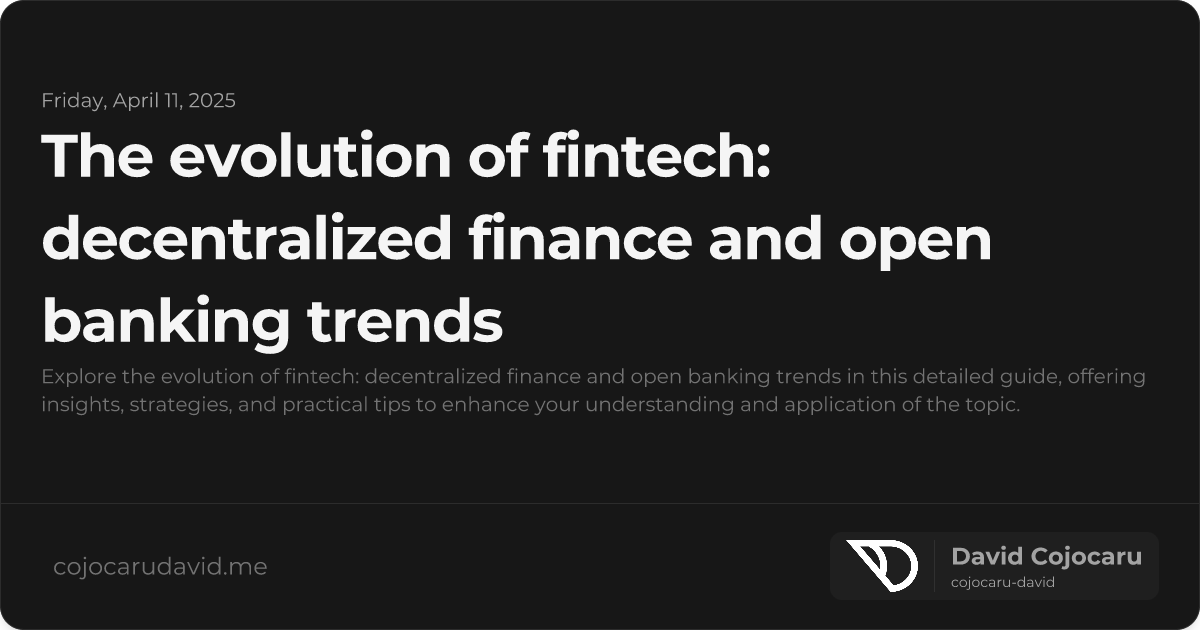The Fintech Revolution: Exploring Decentralized Finance (DeFi) and Open Banking
The financial technology (fintech) landscape is exploding with innovation, and two trends are leading the charge: Decentralized Finance (DeFi) and Open Banking. These aren’t just buzzwords; they’re fundamentally changing how we interact with money, promising greater transparency, accessibility, and efficiency. This post dives deep into the fintech evolution, examining the rise of DeFi, the impact of Open Banking, and how they might converge to shape the future of finance.
The Decentralized Finance (DeFi) Uprising
Decentralized Finance, or DeFi, is revolutionizing finance by leveraging blockchain technology to remove traditional intermediaries like banks. Imagine a financial system operating on open, permissionless networks, where lending, borrowing, and trading happen directly between individuals, without centralized control. That’s the promise of DeFi.
Understanding the Core of DeFi
DeFi’s power comes from a few key features:
- Smart Contracts: These self-executing agreements automate transactions, eliminating the need for intermediaries and reducing the potential for human error. They’re the engine of DeFi.
- Liquidity Pools: Forget traditional order books! DeFi relies on liquidity pools - crowdsourced funds that enable decentralized trading and lending. Anyone can contribute to a pool and earn rewards.
- Yield Farming: A popular DeFi strategy where users earn rewards by staking or lending their crypto assets. It’s like earning interest on your savings, but with potentially higher returns (and risks).
Platforms like Uniswap and Aave have spearheaded the growth of DeFi, showcasing its potential. However, the space faces challenges, including regulatory uncertainty and security concerns that need to be addressed for wider adoption.
Open Banking: Ushering in an Era of Financial Transparency
Open Banking represents another significant shift in fintech. It mandates that banks share customer data (with explicit consent) securely with authorized third parties through APIs (Application Programming Interfaces). This fosters competition and innovation, empowering developers to create new and personalized financial products.
Unlocking the Benefits of Open Banking
Open Banking unlocks a range of benefits for consumers and businesses:
- Personalized Financial Services: Fintech apps can leverage Open Banking to offer tailored budgeting tools, investment advice, and other personalized services based on a user’s financial data.
- Seamless Payment Experiences: Open Banking facilitates faster, more secure transactions through direct API integrations, bypassing traditional payment networks and reducing fees.
- Increased Competition and Innovation: By opening up access to data, Open Banking forces traditional banks to innovate and improve their services to retain customers, ultimately benefiting everyone.
Regulations like PSD2 in Europe and Open Banking Standards in the UK have driven the adoption of Open Banking, although ongoing concerns surrounding data privacy require careful consideration.
The Potential Convergence of DeFi and Open Banking
While DeFi and Open Banking operate on different principles, their convergence holds tremendous potential to reshape the future of finance:
- Hybrid Solutions: Imagine combining the decentralization and transparency of DeFi with the regulatory compliance frameworks established by Open Banking. This could lead to more secure and accessible financial products for a wider audience.
- Streamlined Cross-Border Payments: By leveraging blockchain technology and open APIs, DeFi and Open Banking could facilitate faster, cheaper, and more efficient cross-border payment solutions.
- Enhanced Security Through Decentralized Identity: Decentralized identity solutions, powered by blockchain, can be integrated with Open Banking to improve security and reduce fraud risks.
Navigating the Challenges and Looking Ahead
Despite their transformative potential, both DeFi and Open Banking face significant challenges:
- Regulatory Uncertainty: Governments worldwide are grappling with how to regulate these emerging technologies, leading to uncertainty and potential roadblocks for innovation.
- Security Risks and Vulnerabilities: Smart contract vulnerabilities and the potential for data breaches remain significant threats in both the DeFi and Open Banking ecosystems.
- Adoption Barriers: Building consumer trust and improving technical literacy are crucial for driving mainstream adoption of both DeFi and Open Banking.
The future of fintech hinges on finding the right balance between innovation and security, ensuring that these technologies are accessible and beneficial for all users. Education and clear regulatory frameworks will be key to unlocking their full potential.
Conclusion: Embracing the Future of Finance
The evolution of fintech, propelled by Decentralized Finance and Open Banking, represents a fundamental shift towards a more accessible, transparent, and efficient financial system. While challenges remain, the potential for these technologies to revolutionize how we manage and interact with money is undeniable. As DeFi and Open Banking continue to mature and converge, they promise to unlock unprecedented opportunities—provided we address the challenges responsibly and proactively.
“The future of finance is about empowerment: giving individuals greater control over their financial lives through decentralized, open, and accessible technologies.”

